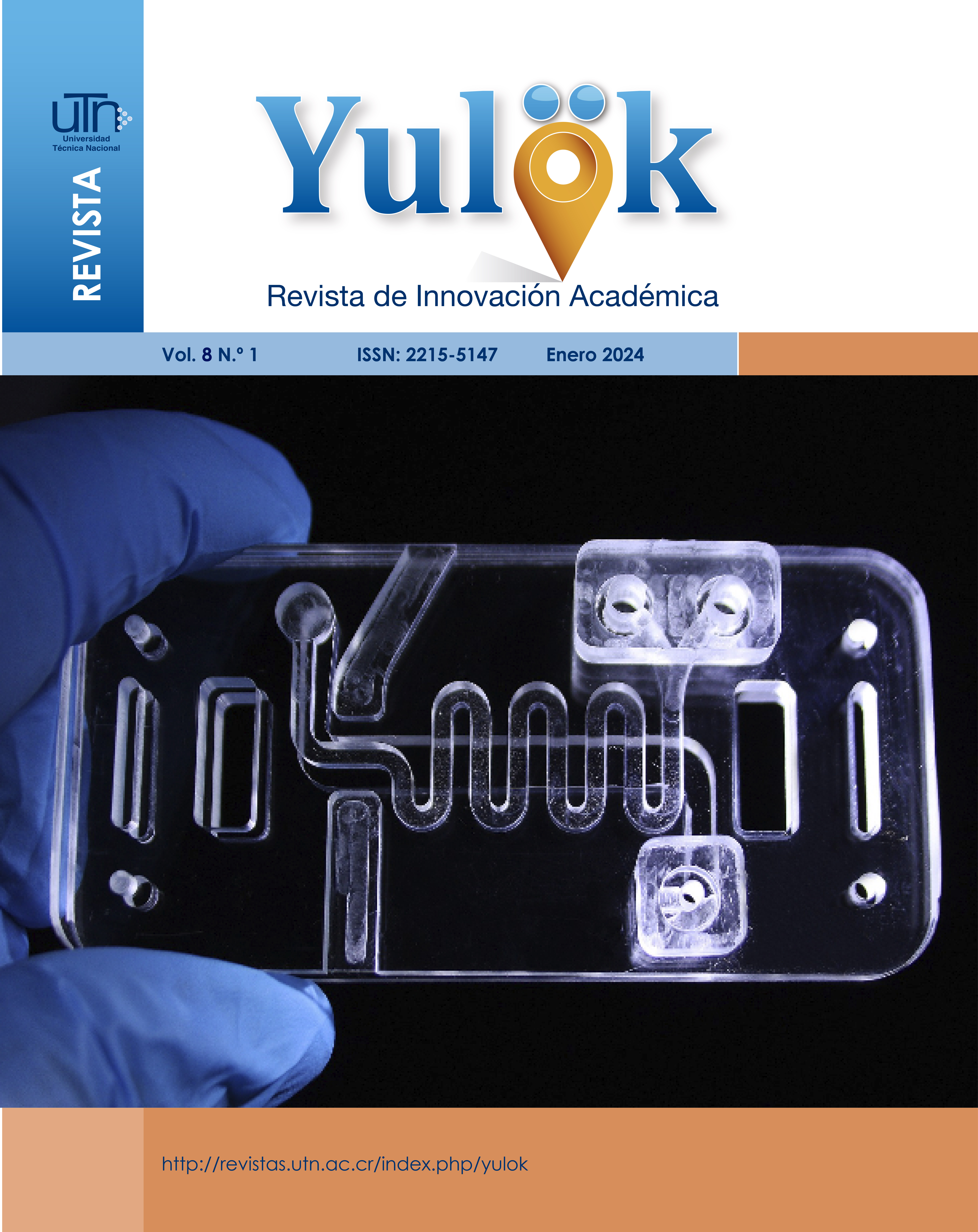Inter and Trans-disciplinary Model for the Statistics Teaching in the Higher Education
Main Article Content
Abstract
The study explores the educational context around the current pedagogical practices in statistics; the characteristics of the teaching and learning processes in Costa Rican higher education; and the main themes that include an inter and transdisciplinary model for the teaching of statistics in higher education. The aim of this research is to argue the theoretical, practical, and formative fundamentals of an inter and transdisciplinary Statistics teaching model in Costa Rican higher education. Methodology: The essence of this design was to seek the lived experiences of different professionals and teachers in higher education in order to obtain a shared description of experiences and educational tasks through the qualitative interpretive paradigm and the phenomenological and grounded theory approach. Results: the information collected provided evidence to infer that there is no agreement between the topics raised and the class methodology; the teacher does not include data mining and the statistical requirements implied by today's society, such as STEAM competencies. Therefore, the reasoning is brief, and there is no decision-making in a social or work context that allows the student to adapt to a professional reality. Conclusion: A contemporary inter- and transdisciplinary Statistics Teaching Model has been proposed, which, according to the characteristics of the fourth industrial revolution, implies that knowledge is discovered, verified, and sustained, using technologies.
Article Details

This work is licensed under a Creative Commons Attribution-NonCommercial-ShareAlike 4.0 International License.
Todos los artículos publicados están protegidos con la licencia Creative Commons Atribución-NoComercial-CompartirIgual 4.0 Internacional
![]()
How to Cite
References
Acosta, A., Aguilar, V., Carreño, R., Patiño, M., Patiño, J. y Martínez, M. (2020). Nuevas tecnologías como factor de cambio ante los retos de la inteligencia artificial y la sociedad del conocimiento. Revista Espacios. 41(05). http://www.revistaespacios.com/a20v41n05/a20v41n05p25.pdf
Acosta, J. (2016). Interdisciplinariedad y transdisciplinariedad: perspectivas para la concepción de la universidad por venir. Alteridad, 11(1), 148-156. https://www.learntechlib.org/p/195391/.
Aguilar, E., Zamora, J. y Guillén, H. (2021). Alfabetización, razonamiento y pensamiento estadísticos: competencias específicas que requieren promoverse en el aula. Revista de la investigación educativa de la Rediech. 12. doi.org/10.33010/ie_rie_rediech.v12i0.1118.
Bañuelos, A. (2020). Educación 4.0. en las instituciones universitarias. REDINE. pp. 70-79. http://www.adayapress.com/wp-content/uploads/2020/09/contec8.pdf
Cárdenas, M. (2019). Modelo pedagógico transdisciplinario en las ciencias administrativas y económicas: Un cambio de paradigma. Aibi revista de investigación, administración e ingeniería. 8(1), pp. 76-85. https://doi.org/10.15649/2346030X.701
Chaves, E. (2016). Reforma de la Educación Matemática en Costa Rica. Cuadernos de Investigación y Formación en Educación Matemática. 13(17), pp. 153-163. https://revistas.ucr.ac.cr/index.php/cifem/article/download/34371/33958/
Domínguez, P., Oliveros, M., Coronado, M. y Valdez, B. (2019). Retos de ingeniería: enfoque educativo STEM+A en la revolución industrial 4.0. Innovación Educativa 19(80). http://www.scielo.org.mx/pdf/ie/v19n80/1665-2673-ie-19-80-15.pdf
Fernández, A. (2020). Retos de la cuarta revolución industrial sobre el mercado laboral costarricense. Academia Centroamericana. https://www.academiaca.or.cr/wp-content/uploads/2020/11/Retos-de-la-IV-Revolucion-Industrial-en-el-mercado-laboral.pdf
Freire, P. (1998). Pedagogía de la autonomía. Saberes necesarios para la práctica educativa. México: Editorial Siglo XXI.
Godino, J., Arteaga, P., Estepa A., y Rivas, H. (2013). Desafíos de la enseñanza de la estadística basada en proyectos. Actas de las Jornadas Virtuales en Didáctica de la Estadística, Probabilidad y Combinatoria. pp. 173-180.
Guérios, E. (2019). Principios didácticos para una práctica matemática transdisciplinar. Cuadernos de Investigación en Educación Matemática. 14(18), pp. 199-209. https://revistas.ucr.ac.cr/index.php/cifem/article/view/39913
Hernández S., Fernández C. y Baptista, M. (2014). Metodología de la Investigación. México: McGraw-Hill. https://www.uca.ac.cr/wp content/uploads/2017/10/Investigacion.pdf
Jara, I. y Ochoa, J. (2020). Usos y efectos de la inteligencia artificial en la educación. https://publications.iadb.org/publications/spanish/document/Usos-y-efectos-de-la-inteligencia-artificial-en-educacion.pdf.
Leal, D, Solano, J. Rojas, C, Torres, M. y Zúñiga, A. (2017). Estrategias basadas en el enfoque interdisciplinario para abordar contenidos del programa de ciencias de octavo año de la educación general básica de Costa Rica. Calidad en la Educación Superior. 8(1), pp. 207-224. https://revistas.uned.ac.cr/index.php/revistacalidad/article/view/1786
Lope, V. Mamaqi, X. y Vidal, J. (2020). La Inteligencia Artificial: desafíos teóricos, formativos y comunicativos de la datificación. 18 (1), pp. 58-88. doi: 10.7195/ri14.v18i1.1434
Miranda, S. y Ortiz, J. (diciembre, 2020). Los paradigmas de la investigación: un acercamiento teórico para reflexionar desde el campo de la investigación educativa. Revista Iberoamericana para la investigación y el desarrollo educativo. 11(21). https://doi.org/10.23913/ride.v11i21.717
Nicolescu, B. (1996). La Transdisciplinariedad. Manifiesto. México: 7 saberes. https://basarab-nicolescu.fr/BOOKS/Manifeste_Espagnol_Mexique.pdf
Pérez, R., Mena, E. y Elicerio, D. (2020). El nuevo enfoque de participación docente ante los retos y desafíos tecnológicos de la cuarta revolución industrial. Revista Espacios. 41(11). https://revistaespacios.com/a20v41n11/a20v41n11p24.pdf
Ruiz, A. y Barrantes, H. (2016). Desafíos para la formación inicial de docentes ante los programas oficiales de matemáticas en Costa Rica. Cuadernos de Investigación y Formación en Educación Matemática. 11(14), pp. 9-81. https://revistas.ucr.ac.cr/index.php/cifem/article/view/23239/23566
Salazar, M., Icaza, M., y Alejo, O. (2018). La importancia de la ética en la investigación. Universidad y Sociedad, 10(1), pp. 305-311. http://rus.ucf.edu.cu/index.php/rus
Soler, M., Cárdenas, F. y Hernández, F. (2018). Enfoques de enseñanza y enfoques de aprendizaje: perspectivas teóricas promisorias para el desarrollo de investigaciones en educación en ciencias. Revista Scielo. 24(4), pp. 993-1012. https://doi.org/10.1590/1516-731320180040012
UNESCO. (2019). La inteligencia artificial en la educación. https://es.unesco.org/themes/tic-educacion/inteligencia-artificial
Valladares, L. (2020). Transdisciplinariedad y pedagogía: apuntes para el debate sobre la (in)disciplina del pedagogo. Revista ensayos pedagógicos. 15(1), pp. 81-102. https://www.revistas.una.ac.cr/index.php/ensayospedagogicos/article/view/13779/19300
Villalobos, L. (2019). Enfoques y diseños de investigación socia: cuantitativos, cualitativos y mixtos. (1 ed, Vol.1). Costa Rica: EUNED.
Zúñiga, A. (2021). Octavo Estado de la Educación. https://repositorio.conare.ac.cr/handle/20.500.12337/8152

